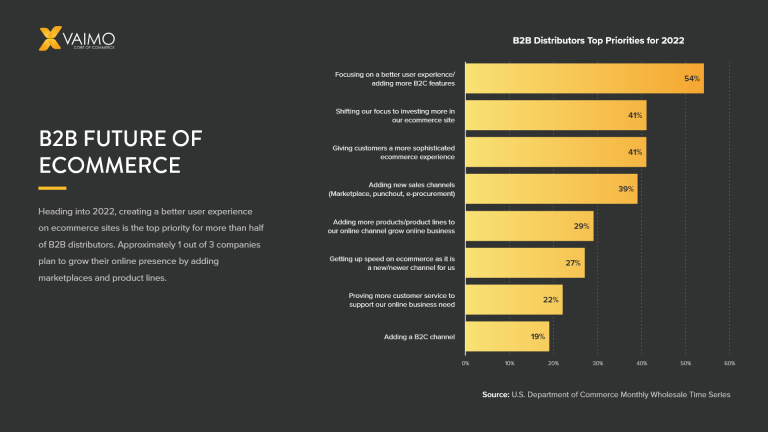For brands operating in business-to-business (B2B) sales, implementing a digital commerce strategy has not always been as obvious of a choice as it has been for B2C brands.
Finally though, B2B ecommerce is taking center stage—now becoming as integral to businesses functioning as its counterparts.
From a rising demand for online research to a transition away from in-person sales, B2B ecommerce is a critical component of a holistic B2B sales strategy.
Today, we will look at the rise of B2B, how this strategy differs from B2C digital commerce, and how your business can benefit from enacting a well-thought-out B2B strategy.
The Rise of B2B Ecommerce
In the simplest terms, B2B involves online order transactions between businesses. These businesses might be wholesalers, manufacturers, or distributors. While B2C commerce has long been the center of attention for online sales, the global B2B digital commerce market is now valued at six times that of the B2C market.
Not only is B2B currently a robust market, but it is growing at rapid rates as more and more business buyers congregate online. According to Forrester, this type of eCommerce transactions will reach $1.8 trillion by 2023, which would account for 17% of all B2B sales in the United States. Those with buying power seek speed, convenience, and easy purchasing experiences, and they are finding these facets through digital commerce.
Additionally, B2B eCommerce has the potential to permanently change the playing field for brands involved in this space. While B2B has traditionally been labor-intensive, involving costly manual sales and marketing strategies, eCommerce helps automate and improve efficiency, thereby reducing costs.
As innovation and technology accelerate forward, the opportunity for brands to increase profits through an eCommerce strategy is only growing.
Unique Differences Between B2B and B2C Ecommerce
While B2B and B2C eCommerce share a similar foundation—sales made online—they vary dramatically in how those sales take place.
These differences are important to note as they influence your business’s strategy around implementing B2B eCommerce.
A more formal relationship
B2B always has and always will involve more formal relationships than B2C sales. For this reason, a B2B digital commerce strategy must focus on providing critical information around products and pricing while maintaining a B2B relationship.
A long-term partnership
B2C often involves one-time transactions, whereas B2B favors long-term partnerships. Businesses are interconnected and interdependent in a way that consumers and brands will never be. This means that brands that invest in a B2B eCommerce platform should ensure that the platform adds convenience to the process. Buyers should be able to access previous orders, submitting reorders of products efficiently.
Multiple decision-makers
While B2C transactions involve a single person, B2B has numerous stakeholders, approval processes, and specific workflows. A platform must accommodate for cross-team collaboration. Multiple account owners should be able to access the same information through a single platform.
Longer buying cycles
Since B2B transactions must consider many factors, the buying cycle is much longer, and transactions are more complex and time-consuming. B2B digital commerce needs to focus on added value throughout the consideration stage.
Complex payment options
Often, payments for B2C are made before products arrive. B2B payments, in contrast, include credit, transfers, or invoices after receiving the goods or services. Invoicing and payment terms can be different based on customer, order size, order value, and the number of orders over time. A B2B platform has to accommodate for the complexity of these payment options.
Varied pricing
The pricing of B2C purchases is usually fixed. B2B pricing, however, is negotiable as per the quantity, volumes, or other factors. Pricing in B2B is very personalized, depending heavily on the relationship with the customer. Ecommerce strategies need to allow for dynamic pricing to ensure that the right customers are accessing the right price points.
The Benefits of Ecommerce for B2B Companies
The B2B industry is showing rapid growth, in line with the changing preferences of those with purchasing power. With the speed of delivery and convenience becoming increasingly important, many B2B brands are investing in eCommerce to keep up with client expectations and to grow their business.
While investing in an eCommerce infrastructure can feel like a weighty decision up front, if your brand embraces this digital strategy, there are five key areas where you will reap the rewards.
Increase Your Brand’s Reach
Almost all B2B buyers today research online before purchasing, and they do so by using various search engines.
This is driven, in part, due to the rise of Millennials in the workplace. According to a report by Merit, 73% of Millennials are involved in product or service purchase decision-making at their companies. The majority of these buyers indicate that digital channels such as search engines, vendor websites, and social media are the most important channels for researching new products and services.
Additionally, with the increasing use of mobile devices, B2B customers are also looking to move seamlessly between devices and platforms. From the same Merit survey, of Millennials in B2B purchasing roles, 82% of respondents cited that mobile devices are important when researching new products and services.
An omnichannel eCommerce solution that supports mobile devices is crucial in engaging B2B customers going forward. In addition to this, an SEO-friendly, responsive website will rank higher on search results, which enables your brand to reach new customers that were previously not part of your sales strategies or marketing efforts.
Inform Your Decisions
One of the most powerful components of a digital commerce strategy for B2B brands is the ability to gather extensive amounts of customer data.
Using an eCommerce infrastructure enables you to collect data and build reports easily. This can offer actionable insights into customer behavior, products or campaigns, and can help you make more informed decisions in running your business. The result is that you will increase revenue and add to market value.
Personalize Your Customer Experience
Customer experience is becoming increasingly important, with B2B buyers expecting the same ease of use as in B2C transactions. 66% of customers expect companies to understand their unique needs and expectations, yet 66% say they feel like they’re generally treated like numbers.
Having an eCommerce solution that enables fast and simple ordering, streamlined processes for order and quote tracking, and access to real-time inventory levels will provide your buyers with a reliable and pleasant customer experience.
Understanding how B2B buyers use products based on previous transactions and tailored engagement is crucial in growing your business. In fact, many customers have identified this as a key feature for companies they want to buy from. With tailored sites, custom catalogs, and price lists, you will be able to provide your customers with the personalized experience they are looking for.
Reduce Costs
Ecommerce provides a great opportunity for B2B brands to reduce operational costs.
An integrated eCommerce site with capabilities for self-service ordering, central order management, and automated inventory sourcing will make site upkeep less time-consuming. This allows staff to focus on other tasks, leading to increased productivity and reduced labor costs.
Additionally, automated systems that don’t require manual data entry eliminate the risk of human error, which contributes to higher profit margins.
Enable Growth and Flexibility
Ecommerce enables businesses to grow rapidly across multiple new channels. Through eCommerce, brands can open stores in multiple languages and currencies, shift to new markets, and expand into B2C or D2C transactions. This is especially important in our current climate, as traditional B2B businesses have faced significant challenges due to COVID restrictions.
With the rapid growth in online sales transactions during the past year and customers’ preferences for purchase online, it is crucial to have an easily scalable eCommerce solution to meet the growing demand.
Implementing B2B Ecommerce into Your Strategy
With most B2B decision-makers preferring to buy online and COVID-19 precautions affecting the way we all work, there has never been a better time to consider investing in eCommerce.
Implementing B2B into your brand’s eCommerce strategy can help you enter new markets, reach existing customers in improved ways, and increase your team’s efficiencies. The key to transitioning your B2B sales to the digital realm is to ensure that you pick the right platform for your brand’s present and future needs.
At Vaimo, we will be happy to assist you in exploring the options available for your business. Our goal is to ensure that whatever platform you choose, you can provide your clients with an optimized digital experience. Reach out today for a consultation to learn more about how an eCommerce strategy could be the key to your business’s continued success.







